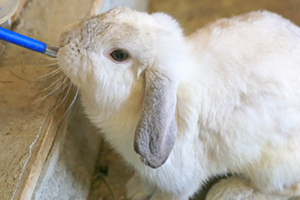Top 3 Myths and Facts about Rabbits

With the help of pet behaviourist Nick Jones and veterinary expert Brian Faulkner, we investigate some of the most common rabbit facts and myths to find out the truth.
Top 3 Rabbit Facts and Myths
Rabbits are often misunderstood as pets. While their size is closer to a cat than a hamster, people frequently underestimate the responsibility and commitment of owning a rabbit.
Rabbits, like dogs or cats, each have their own personalities and complicated needs. But we sometimes accept false, yet widely held, beliefs and myths about them. This means that, while our intentions are positive, we sometimes fail to give the best care to our pet rabbits.
With the help of Nick Jones, Pet Behaviourist and Brian Faulkner, Veterinary Expert, Petplan investigates some of the most common rabbit facts and myths. Find out the truth, with some expert advice here.
“Rabbits live short lives”
People often assume that it is less of a commitment to get rabbits than a cat or dog, since they will live for considerably less time. This is a common underestimation of the responsibility you take on when getting a rabbit.
Rabbits live much longer than we often assume, with an average lifespan of between five and seven years. It is not unusual for rabbits to live for more than ten years. The lifespan of a rabbit is therefore comparable to the lifespan of a dog. So it is important to understand the responsibility you are taking on when adopting or purchasing one.
“Rabbits are happiest outdoors”
We often think that because wild rabbits live outside, our domesticated rabbits must be happier outside too. However, it is better to consider what our rabbits’ needs are and where we are best able to provide these for them.
Rabbits need shelter, stimulation and security, as well as food and water, of course. Shelter and security can be easier to provide indoors, but you may not have enough space to do this. You may also have another preventative factor, such as a cat or dog that doesn’t respond well to rabbits.
When rabbits live outside, it is essential to keep them in a secure enclosure that is out of direct sunlight and at least partially covered. The Rabbit Welfare Association & Fund recommends that a pair of average-sized rabbits should live in a single enclosed area of at least 3m x 2m x 1m high.
There is no universal answer as to whether rabbits should be kept in or out of the home. You must make the decision according to your own circumstances.
Can rabbits live off carrots?
Perhaps because we’ve all seen Bugs Bunny eating them endlessly on TV, people often assume that carrots are a great food to give to their rabbits. Unfortunately, this is a mistaken belief.
Carrots are root vegetables, which rabbits do not eat as a part of their natural diet – this consists of hay and leafy green vegetables. Too many root vegetables can lead to diarrhoea, as it is hard for rabbits to digest the complex carbohydrates contained within them. Furthermore, carrots are very high in sugar, compared with rabbits’ normal dietary staples. Sugar is bad for their health and can easily lead to tooth decay.
If you do want to feed your rabbits carrots, you should only do so sparingly. Don’t ever feed them whole carrots. Instead, try giving them a small slice as a sugary treat.
And never feed carrots – even small slices – to rabbits under six months old. Their diet should consist of only hay, water and pellets, as their digestive systems are not yet robust enough to digest anything more complex.
If you have any concerns about your rabbits’ diet, consult a vet or expert, who will be able to provide advice.
Related Articles:
- Find a Rehoming Centre
- Rabbit Diet and Health
- Things you need to know about your rabbit’s rear end
- A guide to understanding your rabbit’s behaviour
- Rabbit Health: Five Tips for Bouncier Bunnies


